In this article, we will explore what exactly WeCom (WeChat Work) is and how it can be a key extension for businesses to maximize both their top and bottom lines in China.
Table of Content
- Common Challenges Businesses are Facing in the China Market
- What to Know about Clienteling in China
- Clientelling with WeCom – What is WeCom (WeChat Work)?
- How Can WeCom Help?
- Key Takeaways
Common Challenges Businesses are Facing in the China Market
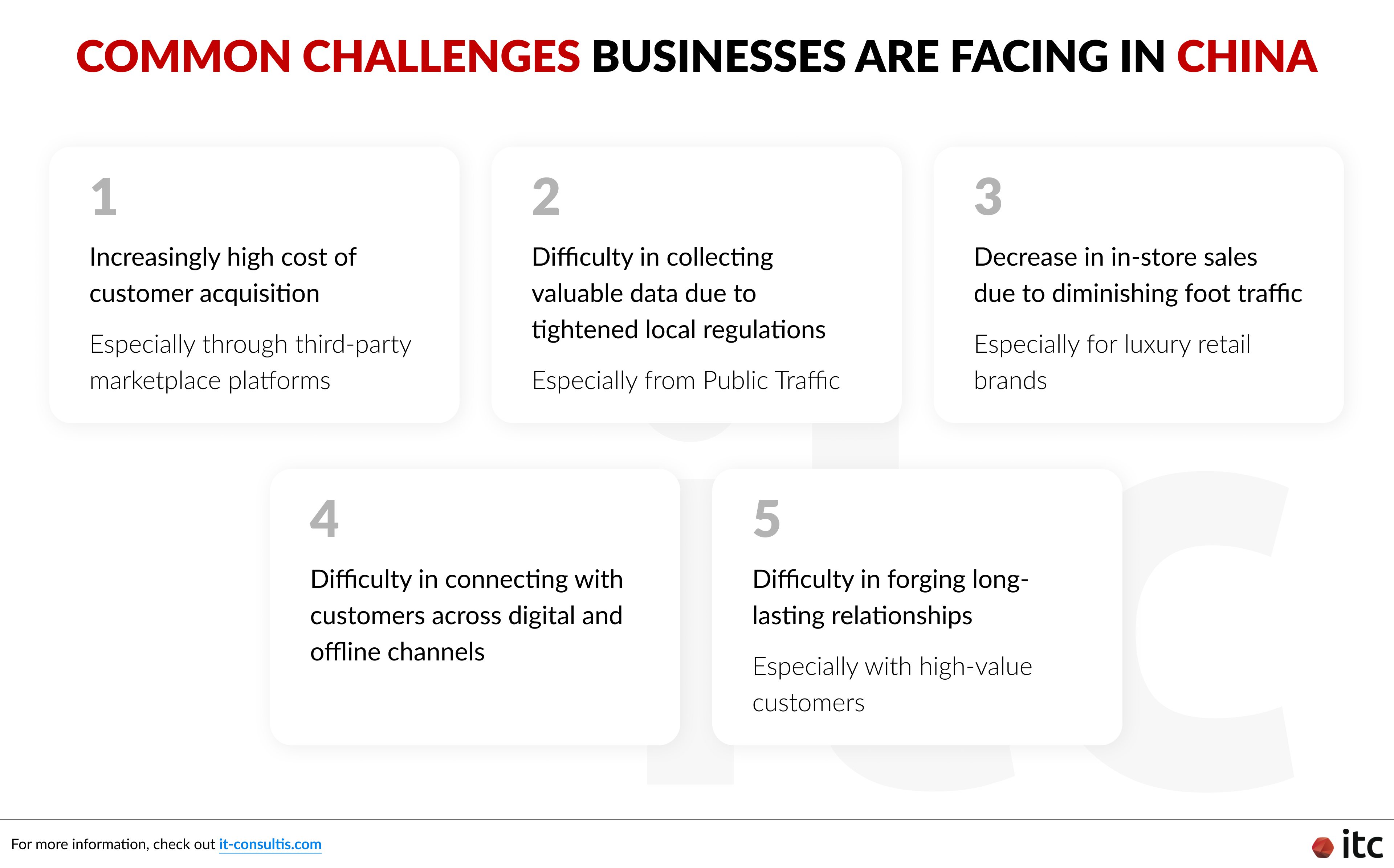
While China has the largest eCommerce market in the world, generating nearly double the revenue of the United States’ in 2022, this also causes one of the most significant hurdles for brands operating in China: the increasingly high cost of customer acquisition, especially through third-party marketplace platforms like Tmall and JD.com.
These platforms are popular with consumers in China, but they can make it difficult for brands to compete for customers’ attention and cultivate a direct relationship with them.
Additionally, brands are also struggling with collecting valuable data from these Public Traffic platforms due to tightened local regulations surrounding data privacy and security, such as the PIPL.
This gives brands very limited control over customer data to generate customer insights, leading to incomplete customer profiles and poorly targeted engagement.
Without a centralized approach to data collection and analysis, it can be difficult for brands to understand their customers fully and provide them with personalized experiences.
Furthermore, in terms of physical retail channels, businesses in China have also been witnessing a decrease in in-store sales due to diminishing foot traffic. In 2022, foot traffic in local malls was reportedly down by 30% – 35% for luxury stores.
However, as China reopens its borders and offline retail gains back momentum, developing innovative strategies to connect with customers seamlessly across digital and offline channels, drive online-to-offline and offline-to-online (O2O) traffic, and capture data is ever more important.
Overall, forging long-lasting relationships, especially with high-value customers in China, can be very challenging. The market is highly competitive, and consumers have high expectations for the brands they engage with.
Therefore, brands need to differentiate themselves and create a unique value proposition that is engaging and resonates with their target audience, one of which is via clienteling.
What to Know about Clienteling in China
Clienteling is the practice of tailoring brand experiences and connecting with customers on an individual level using data collected based on their behaviors and preferences.
It is a critical aspect of building brand loyalty and nurturing long-term relationships with top customers in China’s competitive market, contributing to:
- Establishing a direct connection and building a long-term relationship with the customers
- Delivering exceptionally tailored services and content to the target
- Complimenting engagement in physical retail and online channels
This is especially valuable for businesses with a high average transaction value and a low number of customers, including:
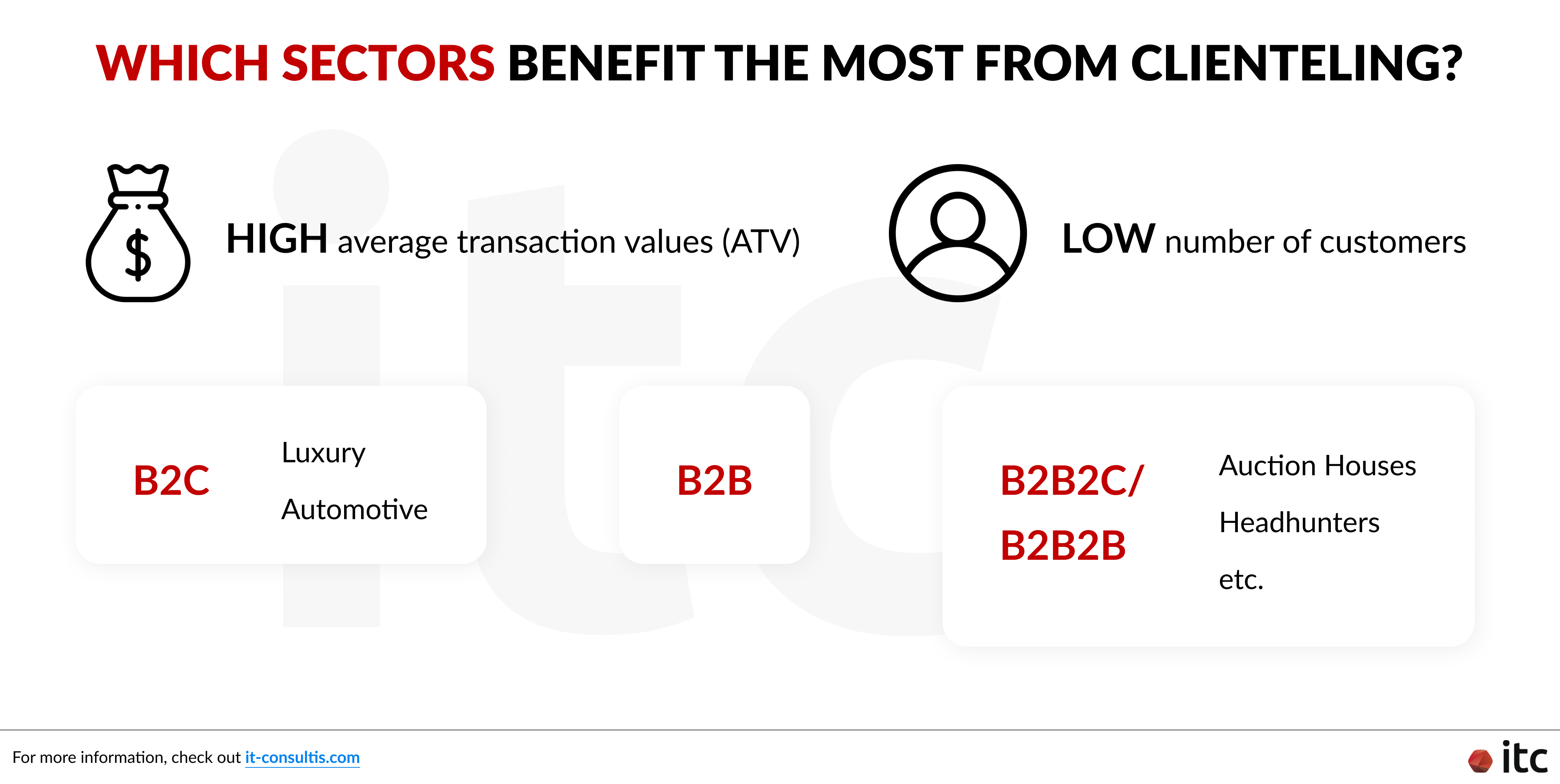
However, there is always room for improvement.
In China, many Sales Associates (SAs), Client Advisors (CAs), and Customer Service (CS) staff are using their personal social accounts on the popular messaging and social media app WeChat for clienteling communication.
This has raised a number of issues (more details will be explored in the WeCom vs WeChat section), including:
- Scattered communication with customers across channels
- Blurring lines between private and professional communication
- Lack or limited ownership of prospects and customers for the brand
- Difficulty in managing the clienteling standard operation procedure (SOP)
- Inability to streamline cross-team communications and track behaviors
- Lack of data insights
- Information security risks
To address these challenges, investment in a dedicated clienteling tool integrated with the WeChat ecosystem like WeCom (WeChat Work) can be a game-changer for businesses to up their clienteling game in China!
In the next section, we will explore how exactly WeCom can help businesses overcome the challenges of clienteling in China.
Clienteling with WeCom – What is WeCom (WeChat Work)?
WeCom (WeChat Work) as a Professional Clienteling Solution
WeCom, used to be known as WeChat Work, is a professional tool developed by Tencent, the parent company of WeChat.
Unlike the standard WeChat app, which is primarily designed for personal use, WeCom is tailored to the needs of enterprise users. It provides a dedicated platform for businesses to streamline customer engagement efforts, manage internal communications, and coordinate team activities.
One of the most significant advantages of WeCom is its robust clienteling capabilities. In particular, Sales Associates, Client Advisors, and Customer Service staff can use their WeCom accounts to engage with clients’ WeChat accounts, thanks to the interoperability between WeCom and WeChat.
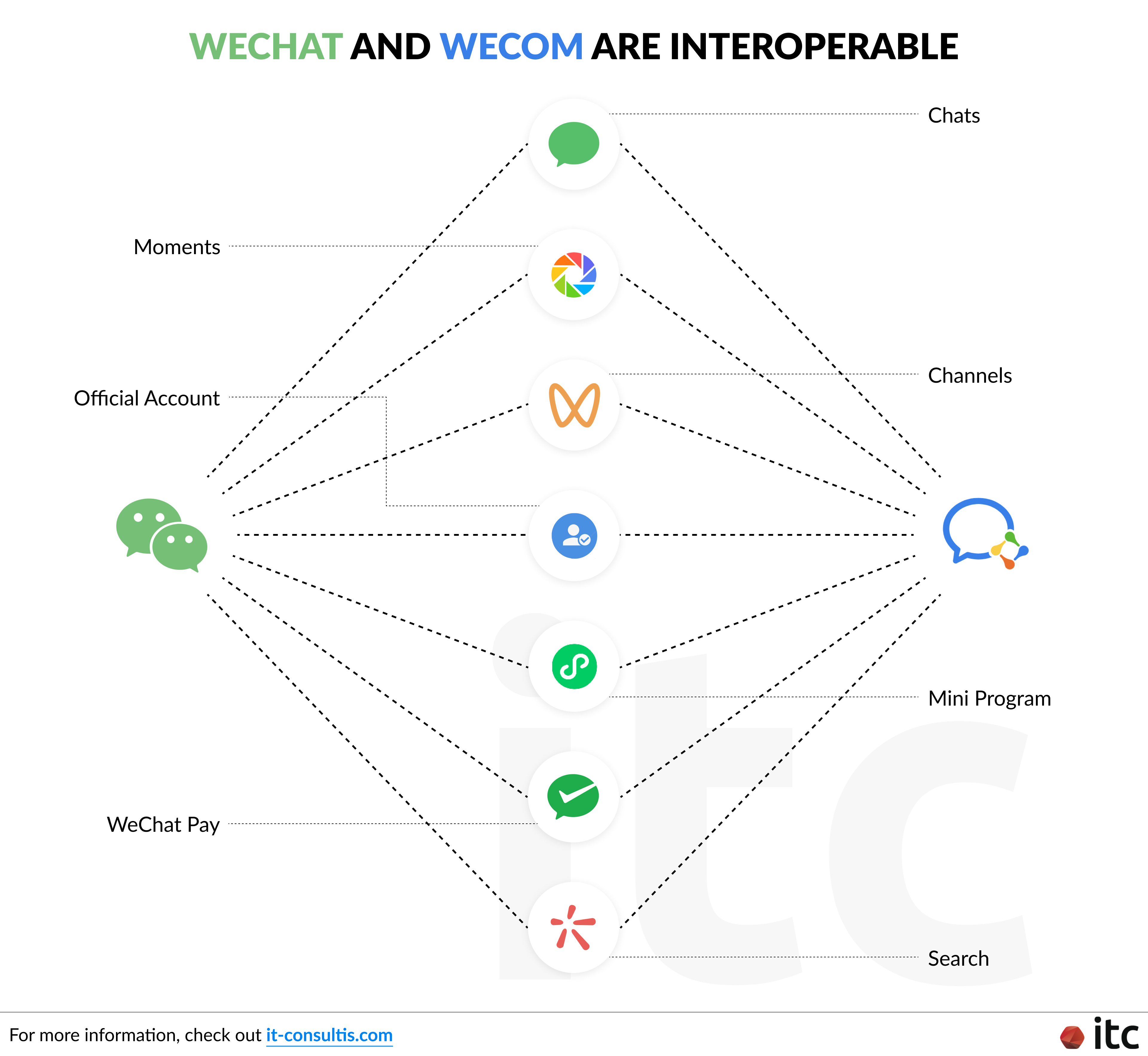
By leveraging holistic data to inform their communication and outreach efforts, brands can send targeted, relevant messaging from a professional platform that resonates with the customers and build a deep and long-term relationship with their most high-value clients.
In recent years, WeCom (WeChat Work) is becoming a key extension to the brands’ approach to Private Traffic management – a crucial piece to businesses’ digital transformation roadmap in China with more and more companies getting on board.
According to the WeCom Whitepaper 2023 by Tencent Advertising Team:
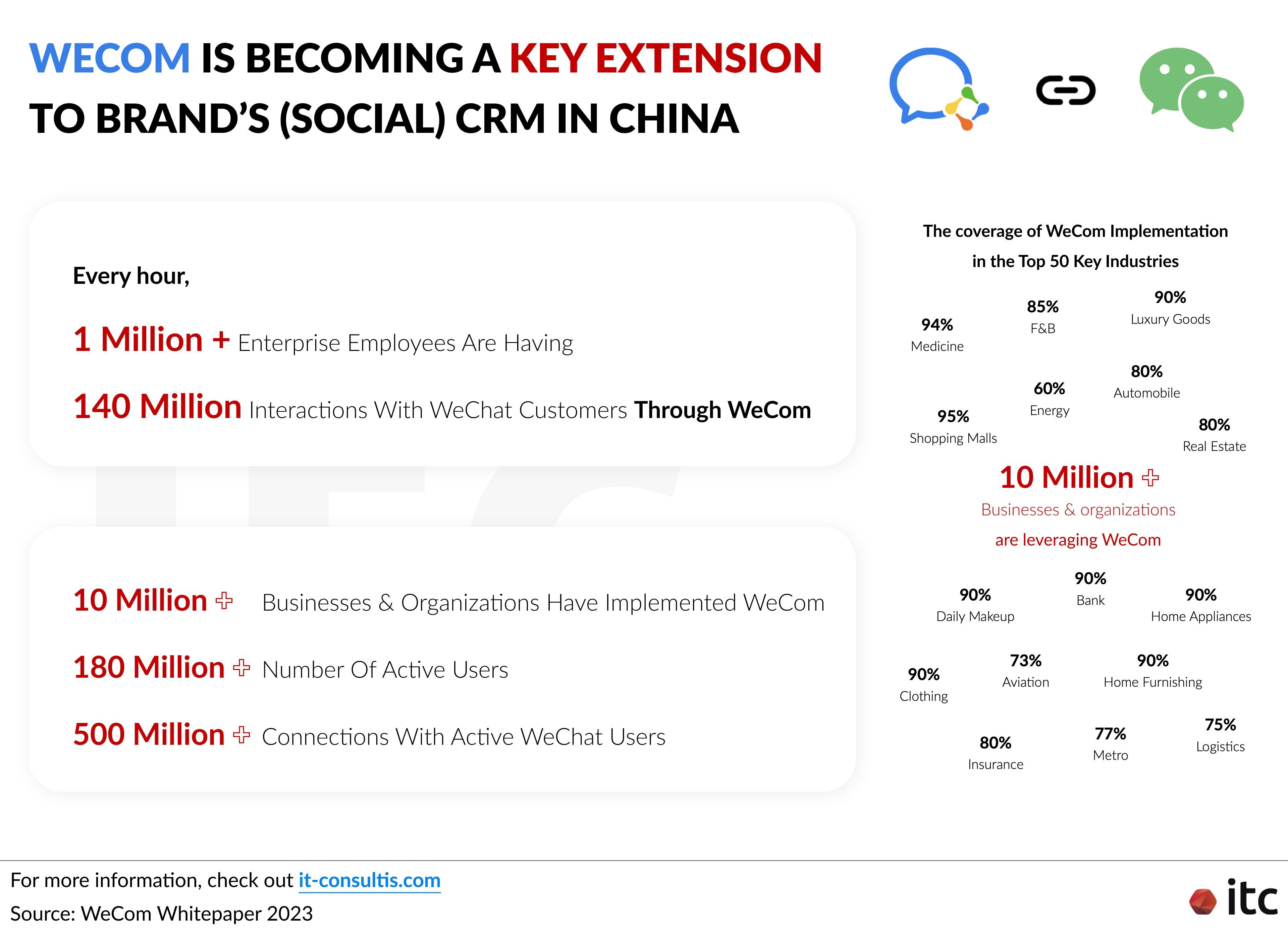
What is the Difference between WeCom and WeChat?
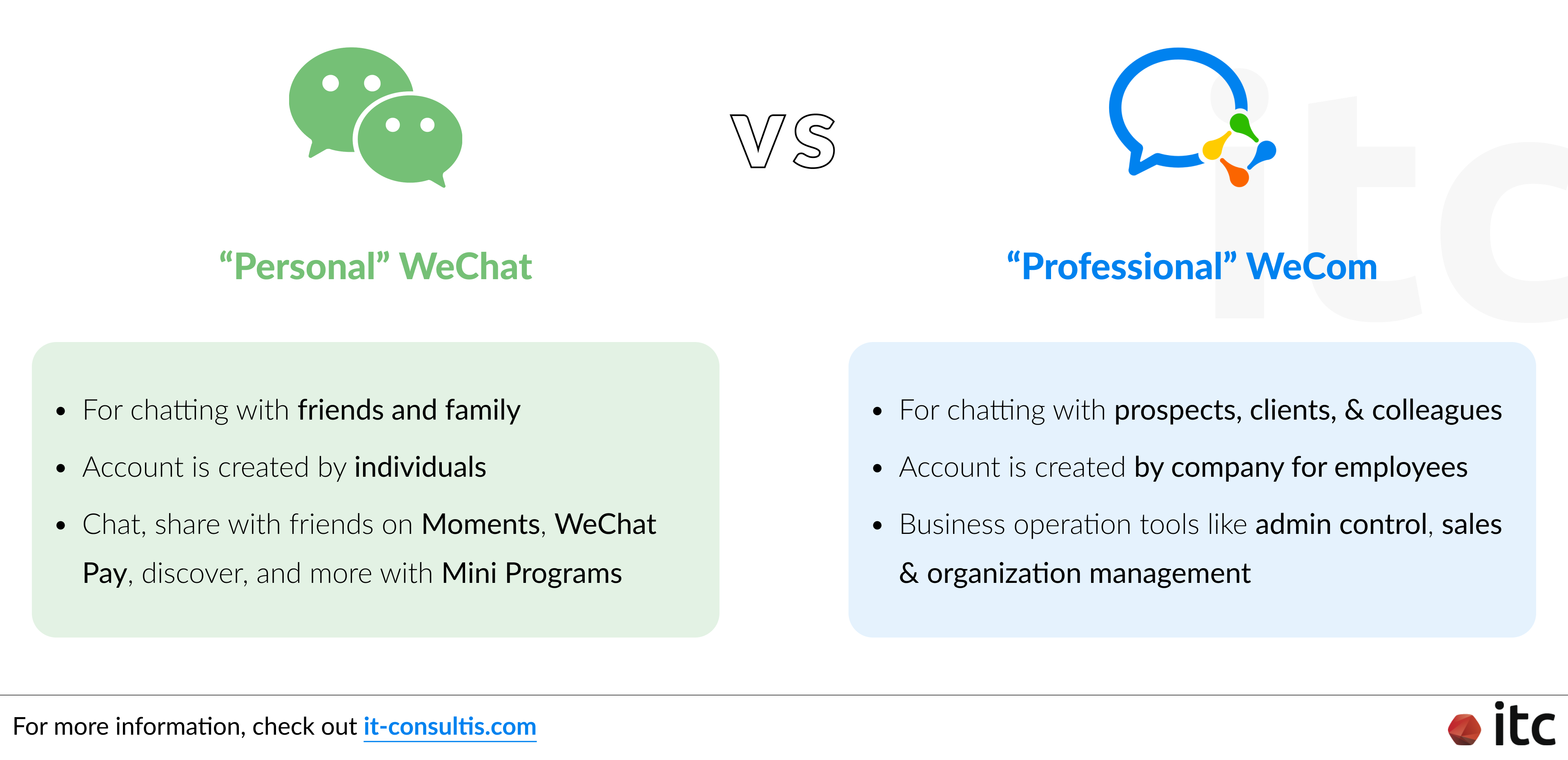
As previously mentioned, WeCom is a professional extension of WeChat, allowing companies to create branded accounts for their employees to chat with prospects, clients, and the internal team.
In addition to chatting, the business and employees also have access to business operation tools including admin control and sales and operation management (More details on various WeCom (WeChat Work) functions and capabilities can be found in the next sections).
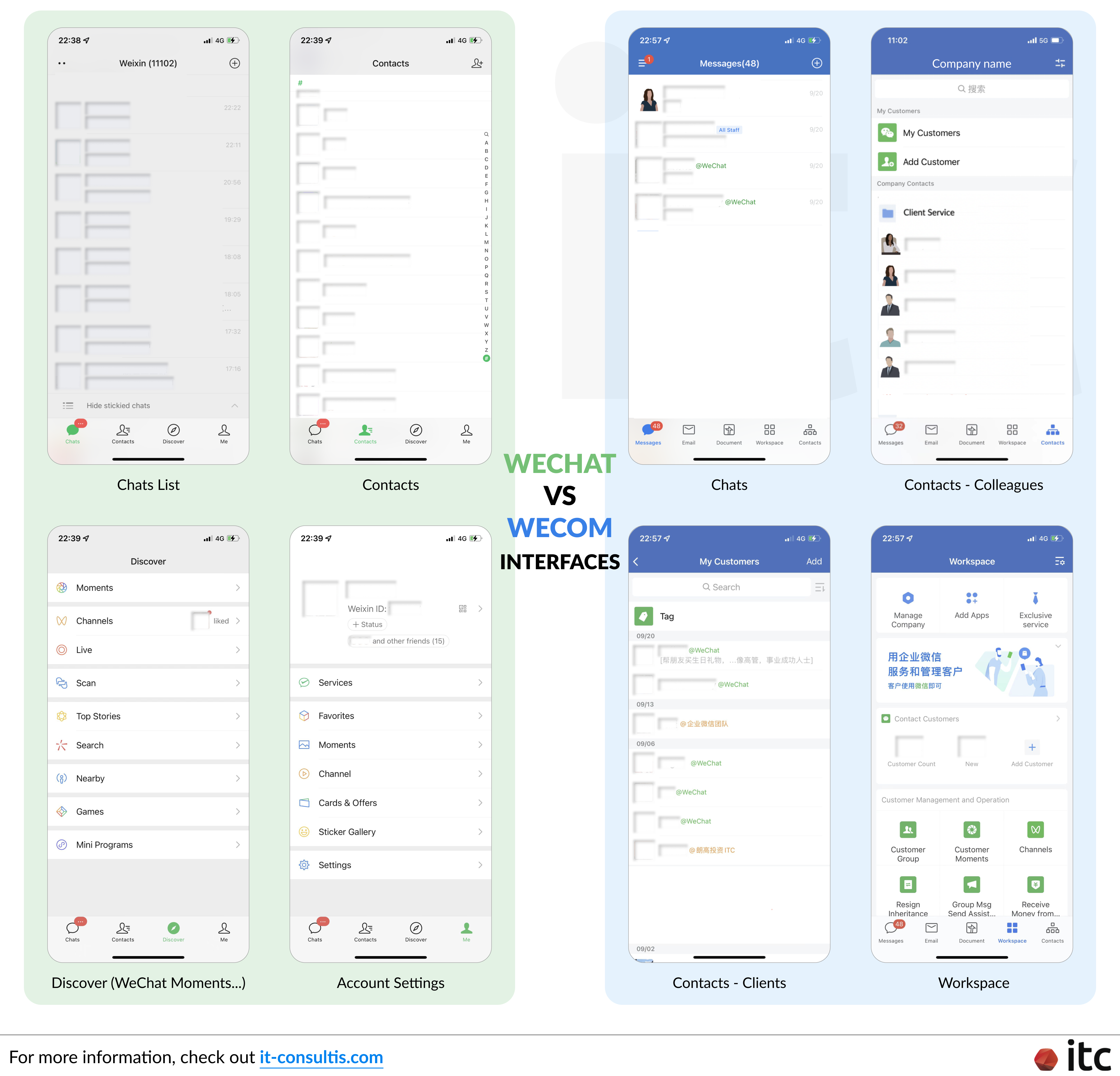
How Can WeCom Help?
With the robust clienteling features, WeCom (WeChat Work) can help alleviate or completely remove the common challenges SAs, CAs, and CS staff face when leveraging WeChat for communication with customers.
To sum up, by leveraging WeCom, brands can now:
- Interconnect the entire WeChat ecosystem and physical retail to deliver seamless and personalized omnichannel customer experiences and drive traffic to other channels (O2O)
- Showcase a professional, trustworthy, and consistently on-brand image across the team to the customers
- Fully own and control all contacts with dashboards and lead inheritance functions to prevent loss of clients due to internal changes
- Set up, implement, and monitor clienteling standard operation procedure (SOP) to deliver quality personalized experiences
- Drive data collection and exportation and leverage direct tagging and lead scoring functions to enrich and build holistic 360° customer profiles
- Facilitate cross-team communication and collaboration (Marketing, Sales, and Customers departments) and synchronize trackable customer data (including integration capability with the brand’s CRM system)
- Enable messaging archiving; and prevent information leaking via screenshots with the watermarking function
For more details, check out our break-down of the 7 key benefits of WeCom (WeChat Work) that are prompting more and more companies to get onboard!
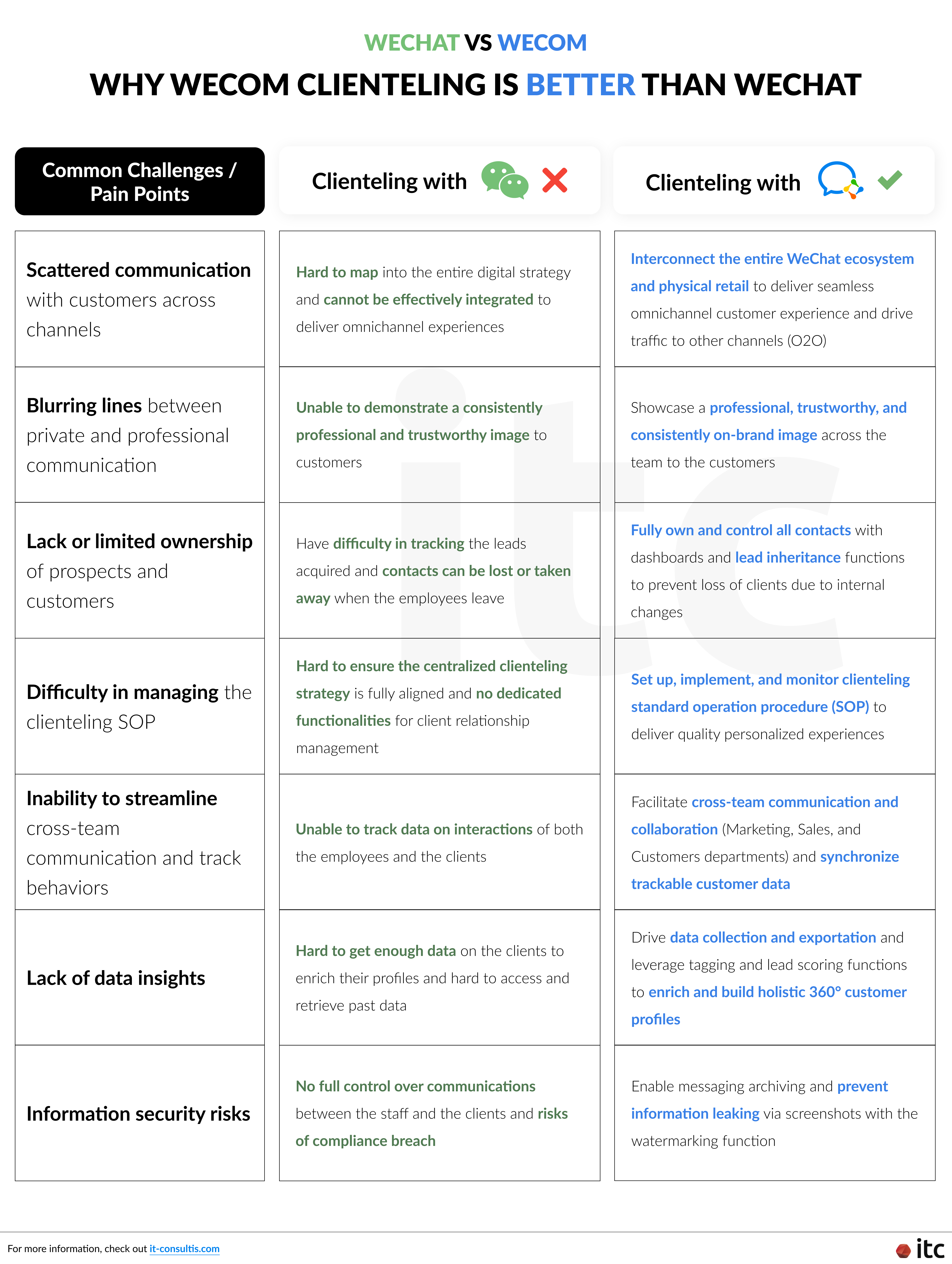
Key Takeaways
Here are the 6 key takeaways about WeCom (WeChat Work) for brands operating in China to keep in mind:
- WeCom is a professional and corporate version of WeChat that is strongly tied to the WeChat ecosystem.
- WeCom addresses WeChat’s weakness in CRM and helps protect brands’ ownership of their customer contact databases.
- WeCom streamlines the management of branding, marketing, and lead generation to keep the staff well-aligned with the brand’s strategy.
- Brands can leverage WeCom clienteling to provide highly tailored customer service, improve engagement, and build long-term personal relationships with the top customers, ultimately boosting customer satisfaction and loyalty.
- With direct tagging through WeCom, it complements the indirect profile capture by Marketing Automation platforms to enrich and build more holistic customer profiles.
- The WeCom platform can also be integrated with the brand’s CRM system to achieve data synchronization and help resolve data silo issues.
Overall, WeCom clienteling is a powerful strategy to complement brands’ acceleration of digital transformation roadmap in China.




